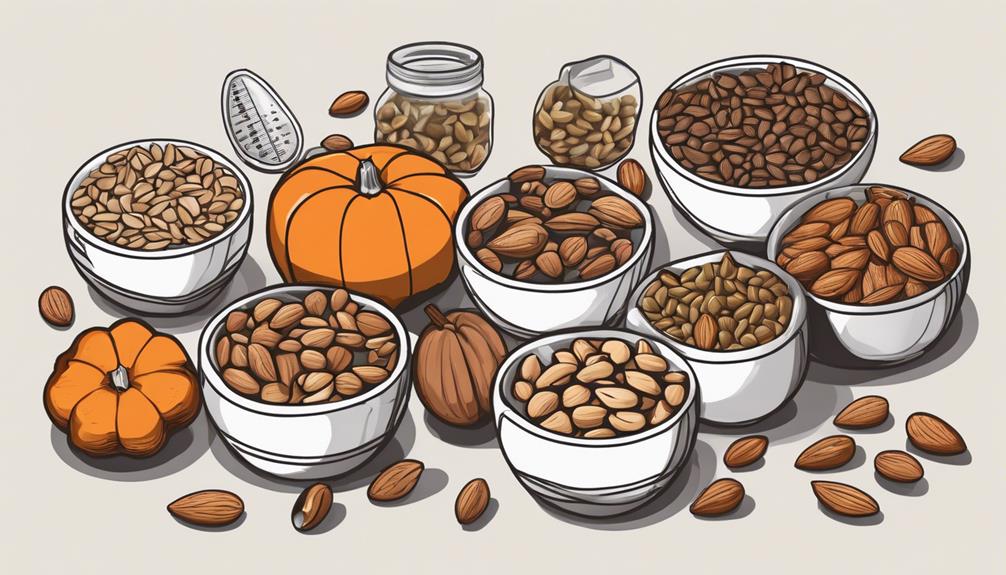When it comes to managing your diabetes, choosing the right protein sources can be the key to maintaining stable blood sugar levels. Picture this: a balanced diet that not only nourishes your body but also supports your overall health.
But how do these protein sources play a crucial role in your diabetic diet plan? Stay tuned to uncover the reasons behind the effectiveness of lean meats, fish, eggs, legumes, nuts, and seeds for individuals with diabetes.
Key Takeaways
- Lean meats and fish aid in controlling insulin response, making them excellent choices for diabetic diets.
- Eggs and legumes provide complete proteins and fiber, supporting blood sugar regulation and muscle maintenance.
- Nuts and seeds offer nutrient-dense options with various health benefits including improved insulin sensitivity and inflammation reduction.
- These protein sources are versatile, convenient, and rich in essential nutrients, making them ideal for managing diabetes and overall well-being.
Benefits of Lean Meats

Lean meats offer a low-fat, high-protein option that can benefit individuals managing diabetes by helping control blood sugar levels effectively. The protein quality in lean meats is exceptional, providing essential amino acids necessary for bodily functions. When compared to fatty cuts of meat, lean meats have a lower fat content, reducing the risk of weight gain and cardiovascular issues, common concerns for those with diabetes. Furthermore, the insulin response to consuming lean meats is more controlled and gradual, preventing sudden spikes or drops in blood sugar levels.
Choosing lean meats like skinless poultry, lean cuts of beef or pork, and game meats can be a smart choice for your diabetes management plan. These options not only offer high-quality protein but also contain important nutrients like iron, zinc, and B vitamins. Incorporating lean meats into your meals can help you feel satisfied, maintain muscle mass, and keep your blood sugar levels stable throughout the day.
Remember to pair your lean meats with a variety of vegetables and whole grains for a well-rounded, nutritious meal that supports your overall health and diabetes management.
Importance of Fish in Diet
To further enhance your diabetes management plan, consider incorporating fish into your diet as it offers numerous health benefits and is a valuable protein source. Fish consumption is linked to various advantages, with one of the most notable being its high Omega 3 content. Omega 3 benefits include reducing inflammation, improving heart health, and aiding in better blood sugar control for diabetics. Incorporating fatty fish like salmon, mackerel, or sardines into your meals can provide you with a healthy dose of these essential fatty acids.
Moreover, fish is a lean source of protein that can help you feel full and satisfied without causing spikes in your blood sugar levels. It's also a nutrient-dense food, rich in vitamins and minerals that are beneficial for overall health. When selecting fish, opt for grilled, baked, or broiled preparations to keep the dish healthy and avoid excess unhealthy fats. By including fish in your diet regularly, you can enjoy its unique nutritional benefits while supporting your diabetes management goals.
Nutritional Value of Eggs

Exploring the nutritional value of eggs reveals a powerhouse of essential nutrients that can benefit your overall health, including as part of a balanced diet for managing diabetes. Eggs aren't only versatile but also packed with beneficial nutrients. Here's why they're great for you:
- Protein: Eggs are a complete protein source, providing all the essential amino acids your body needs.
- Vitamins and Minerals: They're rich in vitamins such as B12, riboflavin, and selenium – important for overall health.
- Choline: Eggs are one of the best sources of choline, crucial for brain health and metabolism.
- Healthy Fats: Contrary to the cholesterol misconception, eggs contain healthy fats like omega-3s that are beneficial for heart health.
When it comes to cooking techniques, opt for poaching, boiling, or scrambling eggs with minimal oil instead of frying to keep them healthy. Including eggs in your diet can be a nutritious choice for managing diabetes and improving your overall well-being.
Legumes for Protein Intake
Eggs provide a valuable source of protein, and incorporating legumes into your diet can further enhance your protein intake while managing diabetes effectively. Legumes, such as beans, lentils, and chickpeas, are excellent plant-based proteins that offer a myriad of health benefits for individuals with diabetes. These legumes aren't only rich in protein but also contain high amounts of dietary fiber, which can help regulate blood sugar levels and improve insulin sensitivity.
Including legumes in your meals can help you feel full for longer periods, reducing the temptation to snack on unhealthy foods. The fiber content in legumes slows down the digestion and absorption of carbohydrates, preventing spikes in blood sugar levels. Additionally, the protein in legumes can aid in muscle maintenance and repair, crucial for overall health and managing diabetes.
Incorporating a variety of legumes into your diet, such as black beans in salads, lentils in soups, or hummus made from chickpeas, can add delicious flavors and textures to your meals while providing essential nutrients to support your diabetic management.
Nuts and Seeds for Snacking

Enhance your diabetic management by incorporating nuts and seeds into your snacking routine for a satisfying and nutritious option. These fiber-rich options can help with blood sugar control and provide a host of other health benefits. Here's why nuts and seeds are ideal for diabetics:
- Almonds: Packed with monounsaturated fats, almonds can improve insulin sensitivity and help regulate blood sugar levels.
- Chia Seeds: High in fiber and omega-3 fatty acids, chia seeds can slow down digestion, preventing spikes in blood sugar.
- Walnuts: Rich in antioxidants and alpha-linolenic acid, walnuts can reduce inflammation and improve heart health, crucial for diabetics.
- Pumpkin Seeds: These seeds are a good source of magnesium, which plays a role in carbohydrate metabolism and insulin sensitivity.
Including a variety of nuts and seeds in your snacking repertoire can provide you with a convenient and delicious way to support your diabetic health goals.
Frequently Asked Questions
Are There Any Specific Lean Meats That Diabetics Should Avoid?
When managing diabetes, it's wise to avoid processed meats due to their high salt and fat content. Opt for plant-based alternatives like tofu or legumes. These dietary restrictions can help you find healthier protein sources that support your well-being.
How Often Should Fish Be Incorporated Into a Diabetic's Diet for Optimal Health Benefits?
You should aim to include fish in your meals at least two to three times a week. Fish consumption, rich in omega-3, supports diabetes management by reducing inflammation and improving heart health. Prioritize this nutritious choice.
Can the Cholesterol in Eggs Negatively Impact Blood Sugar Levels in Diabetics?
Eggs can impact cholesterol levels but don't typically affect blood sugar negatively in diabetics. Moderation is key. Consuming them in a balanced diet can provide essential nutrients without spiking glucose levels.
Are There Any Legumes That Are Particularly High in Protein and Low in Carbohydrates for Diabetics?
When looking for legume options, consider high-protein, low-carb choices like lentils and chickpeas. Their fiber content aids in blood sugar control. Use these protein-rich snacks for meal planning to help manage your diabetes effectively.
What Are the Best Ways to Incorporate Nuts and Seeds Into a Diabetic-Friendly Diet Without Causing Blood Sugar Spikes?
To incorporate nuts and seeds into a diabetic-friendly diet without causing blood sugar spikes, start by adding a sprinkle of variety to your meals. Practice portion control, consider meal timing, and be mindful of carbohydrate intake. Remember to monitor blood sugar, stay active, plan your meals, manage stress, and lean on your support system.
Conclusion
In conclusion, these protein sources are like a shield protecting against the blood sugar spikes that threaten to invade your body. They're the superheroes in your diet, fighting off the villains of diabetes with their powerful nutrients.
Incorporating lean meats, fish, eggs, legumes, nuts, and seeds into your meals won't only help regulate your blood sugar levels, but also provide you with the strength and energy you need to thrive.
Embrace these protein powerhouses and take control of your health today.